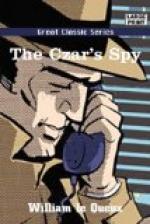The canny Scot, whose name was Mackintosh, hesitated a few moments, then answered—
“Well, sir, you see the fishing-boat had sighted us, and we saw her turning back to port to fetch help.”
His excuse was a neat one. Probably it was his neglect to make signals of distress that had aroused the suspicions of the Captain of the Port. From first to last the story of the master of the Lola was, I considered, a very unsatisfactory one.
“How long have you been in Mr. Hornby’s service?” I inquired.
“Six months, sir,” was the man’s reply. “Before he engaged me, I was with the Wilsons, of Hull, running up the Baltic.”
“As master?”
“I’ve held my master’s certificate these fifteen years, sir. I was with the Bibbys before the Wilsons, and before that with the General Steam. I did eight years in the Mediterranean with them, when I was chief mate.”
“And you’ve never been into Leghorn before?”
“Never, sir.”
I dismissed the captain with a distinct impression that he had not told me the whole truth. That cicatrice did not improve his personal appearance. He had left his certificates on board, he said, but if I wished he would bring them to me on the morrow.
Was it possible that an attempt had actually been made to cast away the yacht, and that it had been frustrated by the master of the felucca, who had sighted the vessel aground? There certainly seemed some mystery surrounding the circumstances, and my interest in the yacht and its owner deepened each hour. How, I wondered, had the captain received that very ugly wound across the cheek? I was half-inclined to inquire of him, but on reflection decided that it was best to betray no undue curiosity.
That evening when the fiery sun was sinking in its crimson glory, bathing the glassy sea with its blood-red light and causing the islands of Gorgona and Capraja to loom forth a deep purple against the distant horizon, I took a cab along the old sea-road to the port where, within the inner harbor, I found the Lola, one of the most magnificent private vessels I had ever seen. Her dimensions surprised me. She was painted dead white, with shining brass everywhere. At the stern hung limply the British flag, while at the masthead the ensign of the Royal Yacht Squadron. The yellow funnel emitted no smoke, and as she lay calmly in the sunset a crowd of dock-loungers and crimps leaned upon the parapet discussing her merits and wondering who could be the rich Englishman who could afford to travel in a small liner of his own—for her size surprised even those Italian dock-hands, used as they were to seeing every kind of craft enter the busy port.
On stepping on deck Hornby, who like myself wore a clean suit of white linen as the most sensible dinner-garb in a hot climate, came forward to greet me, and took me along to the stern where, lying in a long wicker deck-chair beneath the awning, was a tall, dark-eyed, clean-shaven man of about forty, also dressed in cool white linen. His keen face gave one the impression that he was a barrister.




